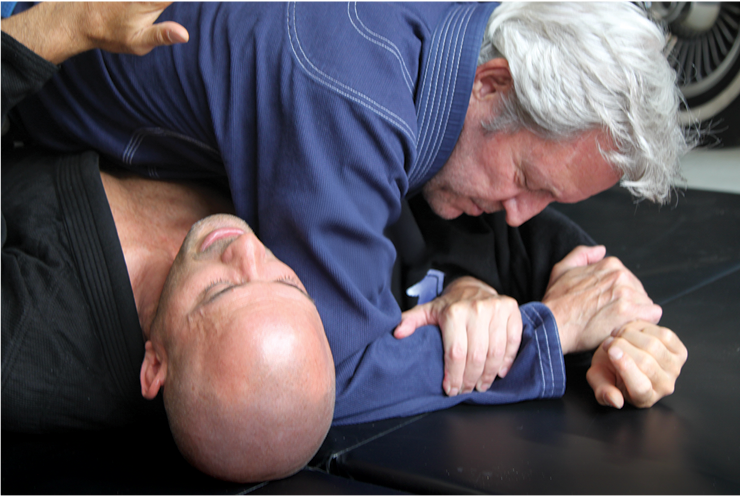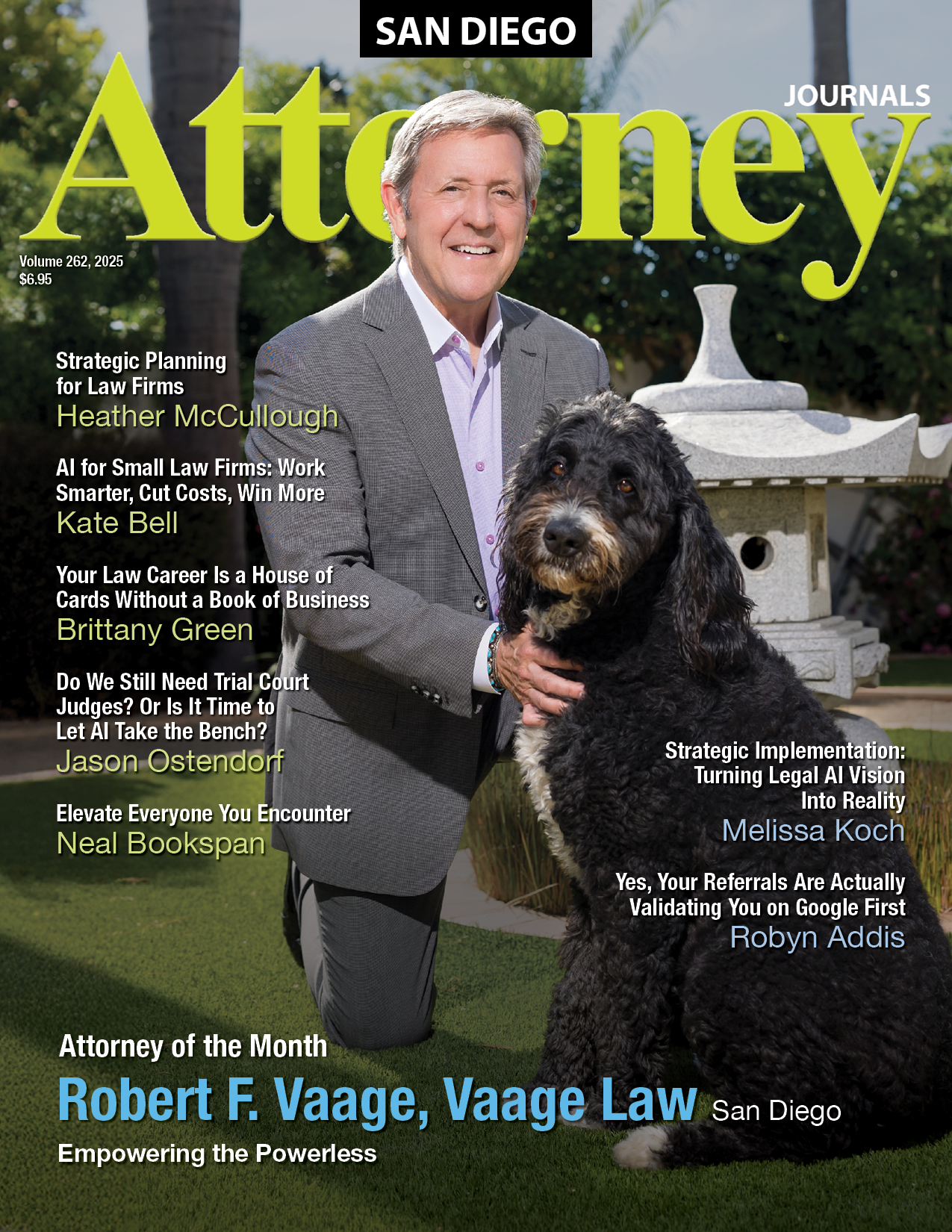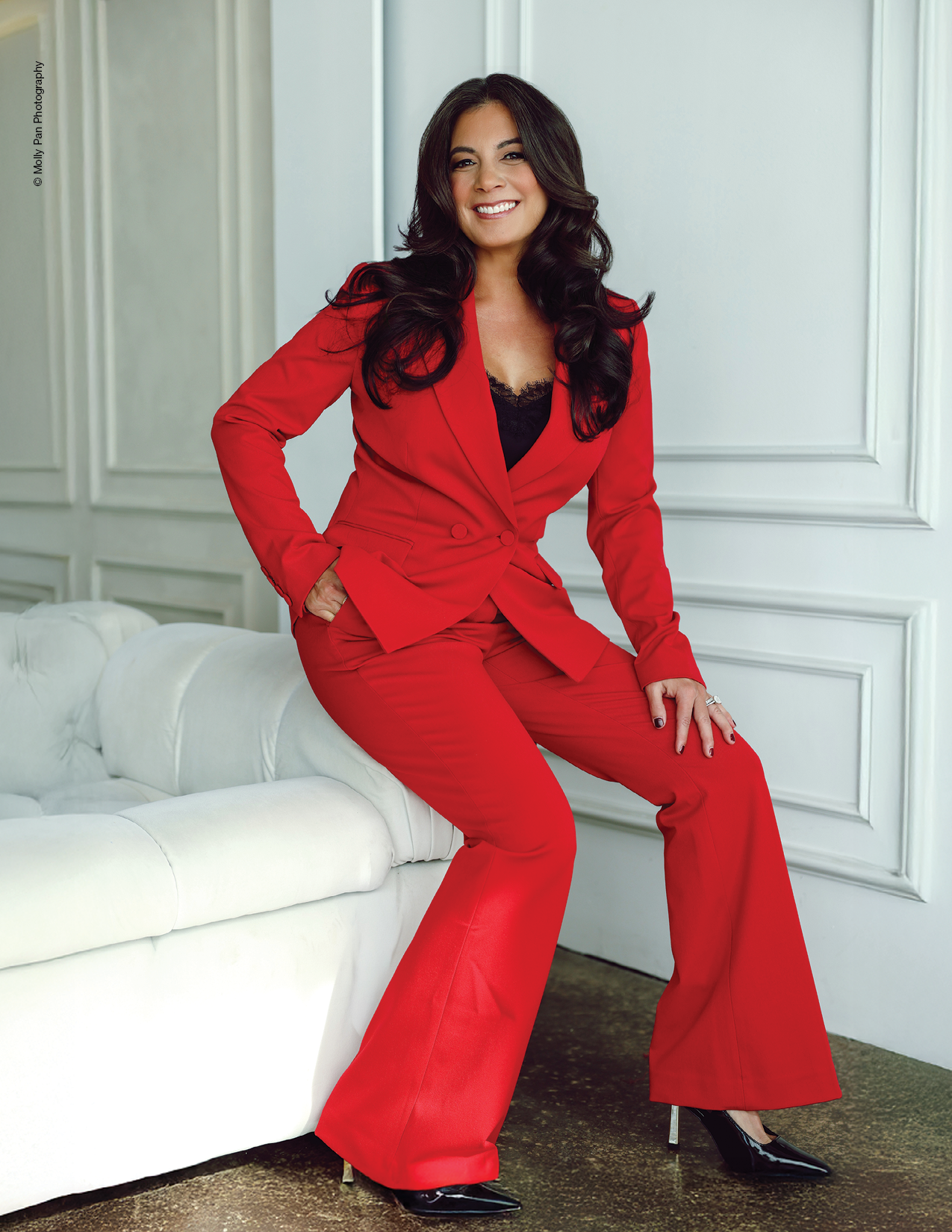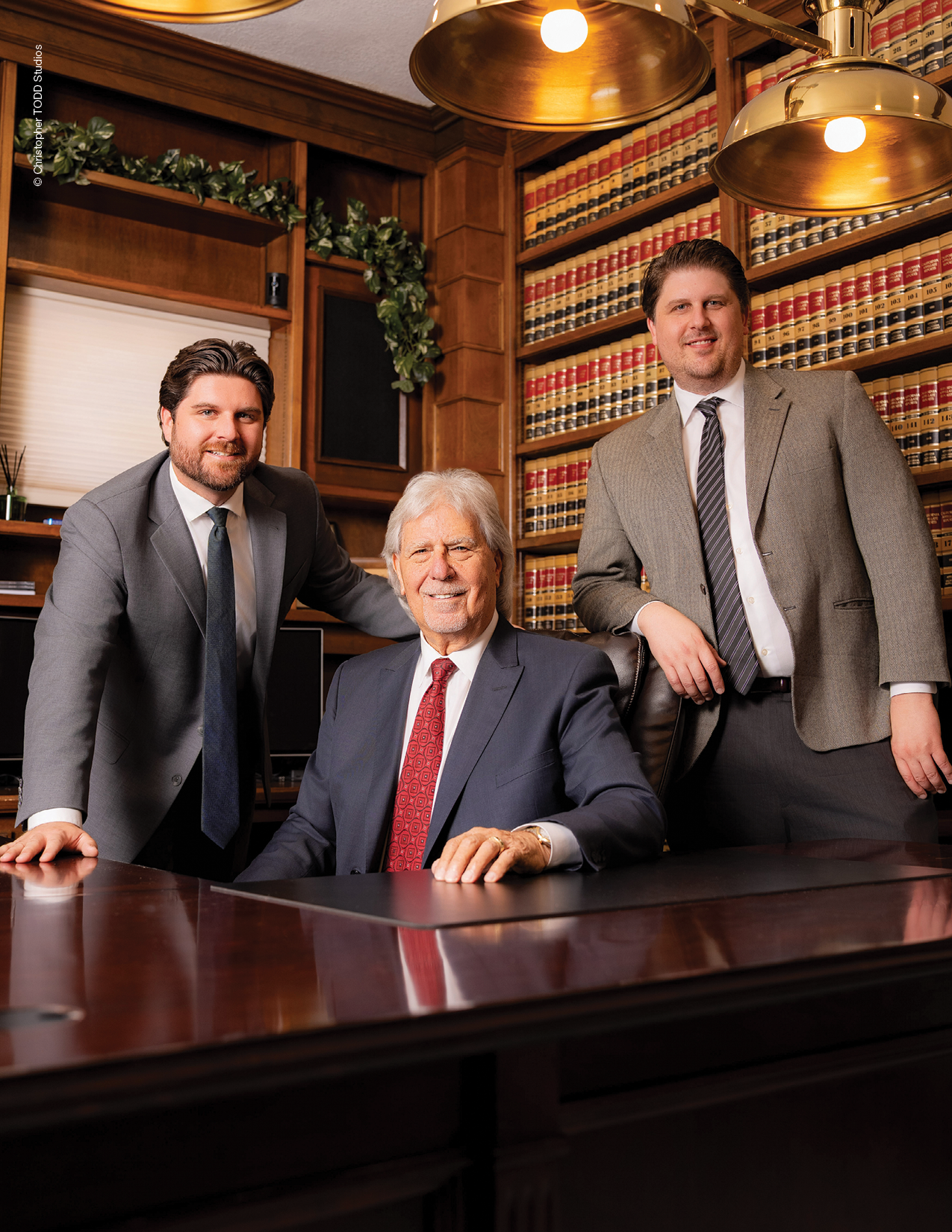Empowering the Powerless
Contact
Robert F. Vaage
Vaage Law
402 W Broadway, Suite 1500
San Diego, CA 92101-8509
When asked, “What makes you special?” Robert F. Vaage (pronounced “v-oh-gee”), founder of Vaage Law, says, “Nothing, really. I have good instincts and lots of experience in the courtroom. When I’m trying a case, I’m not just presenting evidence—I’m telling a story that resonates with jurors on a very human level. I’m sensing jury reactions, witness discomfort, shifting moods, and I’m adapting in real time. I don’t know if that makes me special, but it helps me in jury trials.”
The Making of a Trial Attorney
Vaage played a lot of sports growing up. “When you’re the youngest kid on the block by five years, you’d better be competitive or you won’t survive.” When he realized no one was going to pay him to play baseball for a living, he decided to go to law school. He thought a law career was a natural channel for his competitive nature, his sense of right and wrong, and his desire to help people who were unable to help themselves.
For a couple of years during law school in Sacramento, Vaage dabbled in politics, working with California Senate Pro Tempore David Roberti in the early 1980s to serve his community. It didn’t take long for Vaage to realize that he wasn’t cut out for politics. He decided there were other ways to help people.
After passing the bar, Vaage began his legal career in San Diego with the defense firm of Rhoades, Hollywood and Neil. Guided by mentors such as John Rhoades and Michael Neil, Vaage learned firsthand about reputation and credibility, about the strength and weight of one’s word and integrity. When Attorneys Rhoades or Neil spoke, everyone listened.
In 1986 he was recruited by Daniel T. Broderick III and began his career representing plaintiffs in personal injury cases. Broderick got his M.D. from Cornell University and his J.D. from Harvard Law School. He had a unique combination of medical knowledge and training plus legal acumen. Broderick, who was also good friends with Neil, reinforced the importance of credibility, reputation and integrity.
Vaage tried his first case in 1987 while working for Broderick and knew this was his calling. Vaage represented the parents of a 16-year-old teenager who died while participating in a state-mandated physical performance test at his high school. He collapsed during a six-minute jog/walk, complaining of leg cramps and exhaustion. He sat down on the grassy infield on the running track while the other students returned to the lockers. He was found unconscious 15-20 minutes later. If he had received CPR within six minutes, he would have survived.
Vaage tried the case against a very well-known defense lawyer, who was tough on young and inexperienced Vaage. The jury returned in two hours, 12-0 in his clients’ favor, awarding twice what Vaage asked. “It was my first time feeling the anticipation of waiting for the jury to come back and the exhilaration when the jury verdict is read. This is what I want to do—I want to be a trial attorney. I was congratulated by opposing counsel, who told me, ‘I’ve never been beat up so badly.’” Vaage learned two important things from his mentor, Dan Broderick: First, pay attention to detail in everything you do, and second, treat everyone with professionalism and respect.
Founder, Robert ‘Bob’ Vaage and Dakota
A Small Firm Born from Tragedy
Vaage says his life was a “blur” for two years after the tragic murder of Broderick in 1989. “He wasn’t just my mentor. He was my friend.” Vaage took the “Broderick cases” to Thorsnes, Bartolotta, McGuire & Padilla and tried 15 cases during those two years. During one stretch, he tried nine cases in ten months, going from closing argument in one case to arguing motions in limine in another. When the last of the cases was resolved, Vaage opened his own firm. “I wanted to set my own mark and standards. I wanted the successes and failures to be mine.”
Today, Vaage employs one associate attorney, three paralegals, an intake specialist and a legal secretary. “We’re a small firm. I made the choice not to create a large firm for two reasons: One was not wanting to rely on other people too much. And secondly, I wanted to control the number of cases I had so that I could provide the best possible service to each client.” Vaage has tried over 50 jury trials to verdict and represented patients in more than 30 Kaiser arbitrations. He was one of the youngest admittees to the American Board of Trial Advocates.
Vaage Law typically represents injured victims or the family of someone who has died as a result of the negligence of another. The injuries are significant, catastrophic, and life-altering. While a good percentage of the cases are medical negligence, others involve auto crashes, product liability, fraud, and pediatric dental malpractice.
This is Bob’s 1965 Corvette, which he takes to auto shows.
A Small Firm with Big Results
One of Vaage’s most dramatic and rewarding cases was a medical malpractice case against Kaiser where the arbitrator awarded $25,638,058.93 for a severely brain injured child. “Every once in a while, a case comes into the office—you can’t explain why, but you just can’t let it go.” At least a dozen other law firms turned the case down. There were over 50,000 pages of medical records. This is a child with a congenital abnormality of his bowels (jejunal atresia) who had a bowel perforation over 7 years earlier and was left with a feeding tube and a brain injury. The case was going to be expensive and time-consuming.
Vaage’s first expert said there wasn’t a case. Vaage would normally let the case go. But there was something about this child, about this family, that made him go painstakingly through the 50,000-plus pages of medical records. New experts confirmed that the doctors/nurses overfed this child leading to perforation, radiologists missed signs of pneumatosis (early sign of bowel ischemia) on imaging, and because the child’s blood pressure remained too low over an extended period of time, he suffered an ischemic brain injury. In the face of overwhelming evidence and expert opinions, Kaiser admitted negligence and causation. The case went to arbitration on damages only. “I still see the family and follow the child’s progress. He’s doing great.” This was one of the largest arbitration awards ever against Kaiser.
In a jail injury case, Collins v. County of San Diego, a jury awarded $12,617,674 against the County of San Diego. The jury found the sheriff’s deputies interfered with paramedics rendering aid to a 32-year-old man who was suffering from slurred speech, hallucinations, and trouble walking due to an electrolyte imbalance. He was arrested for being “drunk in public” and during his time in detention, he fell twice, striking his head and suffering a traumatic brain injury. By the time he reached the hospital, his sodium levels were critical, and he had brain bleeding and contusions. The county filed an appeal challenging the apportionment of damages, but the judgment was affirmed.
Kitrosser v. NuVasive was one of the first medical fraud case trials where the jury found that a medical device manufacturer conspired with a surgeon to commit fraud. The defendant’s neuromonitoring equipment failed to detect a dural tear during spine surgery. The plaintiff presented evidence that the device manufacturer had financial ties to the surgeon who was recommending the procedure, and that NuVasive knew and agreed that the doctor was going to make misrepresentations to the plaintiff about the safety of the device. The award was $2,490,252.
The first dental malpractice case that Vaage tried was Hernandez v. Rose Dental. A child suffered a mild anoxic brain injury as a result of the dentist and staff’s failure to monitor the child after the dental procedure where he was given oral conscious sedation. The jury found that the owner of the dental office violated several laws related to sedation of children. Vaage’s research discovered Denti-Cal (Medi-Cal) paid more for “behavior management” than “conscious sedation.” The biller at Rose Dental admitted to making up diagnoses based on Google searches to justify the behavior management billing code for plaintiff, who had no history of behavior problems. The case was also very difficult because the child had no physical signs of a brain injury, so Vaage presented circumstantial evidence of changes in the child’s behavior and a decrease in cognitive function. The jury awarded $3,550,000.
Vaage made case law in a pregnancy discrimination and retaliation case that resulted in a verdict against the County of San Diego. In Akers v. County of San Diego, the plaintiff was a deputy district attorney who claimed that after she complained about pregnancy discrimination, she was transferred and micro-managed. This was the first time Vaage used video excerpts and electronically projected exhibits and evidence during trial. Almost all of the witnesses were deputy district attorneys. The jury did not find pregnancy discrimination but did find retaliation. The County appealed. The Court of Appeal upheld the verdict, and in the published portion of the ruling specified what could constitute an “adverse action” under the discrimination retaliation statutes.

“There’s a mental aspect to it that a lot of people don’t realize. Jiu Jitsu is kind of a physical version of chess.” —Robert F. Vaage, Founder
Finding Balance
“If you can’t find a way to balance your professional life with your personal life, you’re going to burn out in this business. You need outlets,” Vaage explains.
Family means everything. “My wife, Susan, works in the office as a paralegal. She basically runs the office and allows me to do the few things I do well.” They have a daughter who is an auto mechanic and a son who is a patent and intellectual property attorney. Vaage’s mother lives in town and turns 100 years old in September. Vaage also has two Bernedoodles he affectionately refers to as 80-pound furballs.
Vaage also finds balance through exercise, travel, and charities. He works out every day, goes to hot yoga, and has been a student of Jiu Jitsu for several years now. Vaage likes the strategic thinking involved in Jiu Jitsu. “There’s a mental aspect to it that a lot of people don’t realize. Jiu Jitsu is kind of a physical version of chess. When you get good enough, you start thinking about moves and countermoves two and three moves ahead of your opponent.” He applies this way of thinking to his cases. “Every move is calculated. Seasoned trial lawyers know when to push, when to hold back, when to settle, and when to go to the mat. They see the whole chessboard, not just the next move.”
Vaage and his wife also enjoy adventurous travel. They have trekked after mountain gorillas in Uganda, watched the Great Migration on the Masai Mara Plains in Kenya, snorkeled with sea lions and sea turtles in the Galapagos Islands, hiked for a month in New Zealand, river rafted in wooden dories down the Grand Canyon, and walked the Inca Trail into Machu Picchu. Vaage’s travel mindset is “use it before you lose it.”
He enjoys music, and his tastes are eclectic, ranging from classical to rock to Cuban to Country Western to Mexican. He’s seen the Rolling Stones, Tom Petty, Bruce Springsteen, Dwight Yoakam, The Mavericks, Los Lobos, Ozomatli, and the Talking Heads (David Byrne), to name a few. Vaage and his wife go to the New Orleans Jazz Festival whenever possible, and music is almost always playing in the background when he’s home.
When he’s not traveling or working out, Vaage finds time to help his community. A program near to his heart is Reality Changers. He cites a personal story to illustrate the reason. His mother was the first of her family to go to college. She met a wealthy matron employed by the parks and recreation department who took her under her wing. Without that mentor, his mother said she would have been a hairdresser. Instead, she graduated from UCLA with a degree in education and was a bilingual teacher and administrator for the Los Angeles Unified School District for more than 40 years. Reality Changers works with underprivileged families so that their kids can be the first to go to college too. “The program is extraordinary for its successes. These are migrant families who want a better life for their children, and I’m proud to be a part of helping them achieve that.” Other charities he’s involved with are the San Diego Food Bank, ABOTA Civics Summit, Navy Seals Foundation, Hogar Infantil de Gloria (orphanage), and UCSD Sports Foundation.
Vaage says his life is about helping others. It defines him as an attorney and as a person. He uses every tool he has to help his clients succeed, whether it’s psychological insight, tactical finesse, dismantling an opposing witness with surgical precision, or unshakable poise in the courtroom. At this stage of his career, he also wants to share those hard-earned trial skills with his fellow attorneys, who, like him, want to try cases.

Founder, Robert ‘Bob’ Vaage











